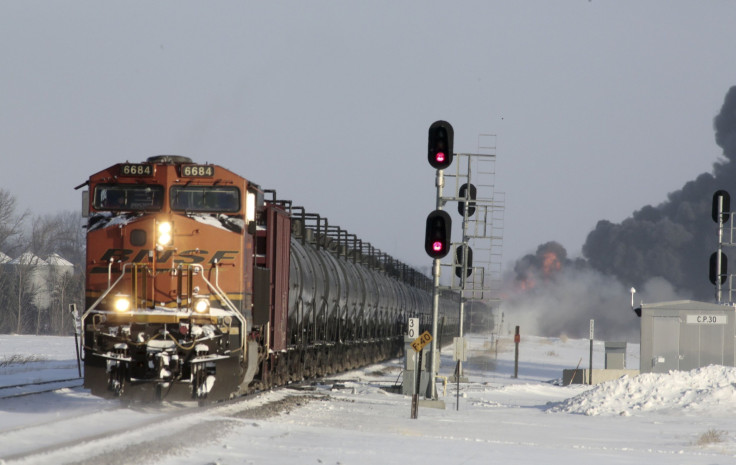After Oil Train Accidents, US Communities Want To Know What's Inside Rail Freight

When an oil train derailed and caught fire in Lynchburg, Virginia, on Wednesday afternoon, City Manager Kimball Payne was as surprised as any of the town’s 77,000 residents; he had no idea that crude oil was being moved through town on a regular basis.
The accident, in which three tank cars tumbled into the James River, spilling 20,000 to 25,000 gallons of crude, was just the latest in a series of fiery oil train accidents around the country, which have sparked debate about the safety of freight rail and raised concerns among residents often unaware of the oil, gas and chemicals being transported through their communities.
As crude-by-rail has increased across the country in recent years, increasing 443 percent nationwide between 2005 and 2012, accidents have been on the rise. In the past year, eight explosive accidents, some fatal, have rocked communities from Alabama to North Dakota. Last year, an accident in Quebec caused 47 deaths and the evacuation of more than 2,000 people.
Those accidents are prompting federal regulators to propose, as soon as next week, standards for rail tank cars carrying oil, announced Department of Transportation Secretary Anthony Foxx.
Community right-to-know laws dating from 1986 require facilities to disclose what hazardous chemicals are stored and used in a town, but the laws don’t extend to trains. By federal law, railroad and oil companies don’t have to disclose their exact freight contents or when and how much of their freight will pass through localities.
“Our community has a right to know what's going on,” Bart Mihailovich, director of the Riverkeepers program at the nonprofit Center for Justice in Spokane, Washington, said. “What trains are traveling through Spokane and the inland northwest, what's in them, and how dangerous are they? We have a right to know about emergency response plans and the risks we're assuming by living, working and playing in this area.”
Payne, Lynchburg’s city manager, has lived in the area for 13 years and said he didn’t know trains were carrying oil through the bustling downtown district until the derailment this week.
“But I don’t know what’s on the tractor trucks going through the city every day either,” Payne said. “What would we do if we did know?”
“If anything’s going to be changed, it’s going to have to be changed at the federal level or maybe the state level. I know I have no authority over those railroads.”
The mayor of Casselton, North Dakota, where an oil train crash on Dec. 30 spilled 400,000 gallons of crude and forced the evacuation of residents, estimates that seven or eight trains a day, most carrying oil, pass through the rural town everyday. Edward McConnell remembers the city council had concerns over chlorine riding the rails several years ago. While training the fire department, the town spoke with the state and federal transportation departments about the contents and amounts of freight passing through.
“Their basic answer was when we have an accident, you’ll know what’s in the cars by the placard,” he said. Red diamond-shaped placards with the numbers 1267 designate crude, though not what type of crude, which could indicate how flammable or explosive it is.
“It would be nice to know [more details of the cars’ contents], but I don’t think it’s something that’s going to get much traction,” McConnell said. “Railroads have a lot of friends in Congress, and they’re not going to let too many bills through that [the railroads] don’t want. I’ve been dealing with railroads a lot of years -- you can go up against them but at the end of the day they pretty much get what they want.”
Activist Matt Landon has decided the only way to know what’s passing through his neighborhood in Vancouver, Washington, is to track it himself. In April, he organized a group of seven volunteers to count how many oil trains are passing by Vancouver Bluff and, with infrared cameras, to monitor hydrocarbon gas venting out of the tank cars, a phenomenon called burping or off gassing. He hopes his efforts over time will force the government to increase regulation on the rail and oil industries.
“We have to protect our community,” he said. “It’s even hard for first responders to have access to this information. The U.S. government is deciding not to protect our communities so we have to stand up.”
© Copyright IBTimes 2024. All rights reserved.






















